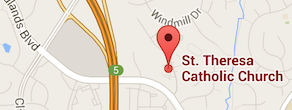Sacraments
The Latin word sacramentum means “a sign of the sacred.” The seven sacraments are ceremonies that point to what is sacred, significant and important for Christians. They are special occasions for experiencing God’s saving presence. That’s what theologians mean when they say that sacraments are at the same time signs and instruments of God’s grace.
There are seven Sacraments of the Catholic Church:
Baptism
Holy Baptism is the basis of the whole Christian life, the gateway to life in the Spirit, and the door which gives access to the other sacraments. Through Baptism we are freed from sin and reborn as sons and daughters of God; we become members of Christ, are incorporated into the Church and are sharers in her mission: Baptism is the sacrament of regeneration through water in the word. (Catechism of the Catholic Church, 1213)
Confirmation
The effect of the sacrament of Confirmation is the full outpouring of the Holy Spirit as once granted to the apostles on the day of Pentecost. From this fact, Confirmation brings and increase and deepening of baptismal grace. It roots us more deeply in the divine filiation which makes us cry “Abba! Father!” It unites us more firmly to Christ. It increases the gifts of the Holy Spirit in us. It renders our bond with the Church more perfect. It gives us special strength of the Holy Spirit to spread and defend the faith by word and action as true witness of Christ, to confess the name of Christ boldly, and never be ashamed of the Cross. (Catechism of the Catholic Church, 1302 and 1303)
Penance and Eucharist
“For I received from the Lord what I also handed on to you, that the Lord Jesus on the night when he was betrayed took a loaf of bread, and when he had given thanks he broke it and said. ‘This is my body that is for you. Do this in a remembrance of me.’ In the same way he took the cup also, after supper, saying ‘This cup is the new covenant in my blood. Do this, as often as you drink it, in remembrance of me.’ For as often as you eat this bread and drink the cup, you proclaim the Lord’s death until he comes.” ( Saint Paul in I Cor. 11: 23-26) Our reception of the sacrament is called Holy Communion “because by this sacrament we unite ourselves to Christ, who makes us sharers in his Body and Blood to form a single body.” (Catechism of the Catholic Church 1331)
Reconciliation
“The Lord Jesus Christ, physician of our souls and bodies, who forgave the sins of the paralytic and restored him to bodily health, has will that his church continue, in the power of the Holy Spirit, his work of healing and salvation, even among her own members.” (Catechism of the Catholic Church, 1421) Those who approach the sacrament of Penance obtain pardon from God’s mercy for the offense committed again him, and are, at the same time, reconciled with the Church which they have wounded by their sins and which by charity, by example, and by prayers labors for their conversion. (CCC 1422) An effect of this sacrament is “peace and serenity of conscience, and spiritual consolation.” (CCC 1496)
Anointing of the Sick
This is the beautiful and comforting prayer said at the anointing: “Through this holy anointing may the Lord in his love and mercy help you with the grace of the Holy Spirit. May the Lord who frees you from sin save you and raise you up.” The grace of this sacrament has as its effects: the uniting of the sick person to the passion of Christ, for his own good and that of the whole Church; the strengthening, peace and courage to endure in a Christian manner the sufferings of illness or old age; the forgiveness of sins if the sick person was not able to obtain it through the sacrament of Penance; the restoration of health, if it is conducive to the salvation of his or her soul; the preparation for passing over to eternal life.” (Catechism of the Catholic Church 1532)
Marriage
“The sacrament of Matrimony signifies the union of Christ and the Church. It gives spouses the grace to love each other with the love with which Christ has loved his Church, the grace of the sacrament thus perfects the human love of the spouses, strengthens their indissoluble unity, and sanctifies them on the way to eternal life.” (Catechism of the Catholic church 16661).
Ordination (Holy Orders)
Holy order is the sacrament though which the mission entrusted by Christ to his apostles continues to be exercised in the Church until the end of time: thus it is the sacrament of apostolic ministry. It includes three degrees: episcopate (bishops), presbyterate (priests) and diaconate (deacons). (Catechism of the Catholic Church 1536) “This sacrament configures the recipient to Christ by a special grace of the Holy Spirit, so that he may serve as Christ’s instrument for his Church. By ordination one is enabled to act as a representative of Christ, Head of the Church, in his triple office of priest, prophet and king.” (CCC 1581)
